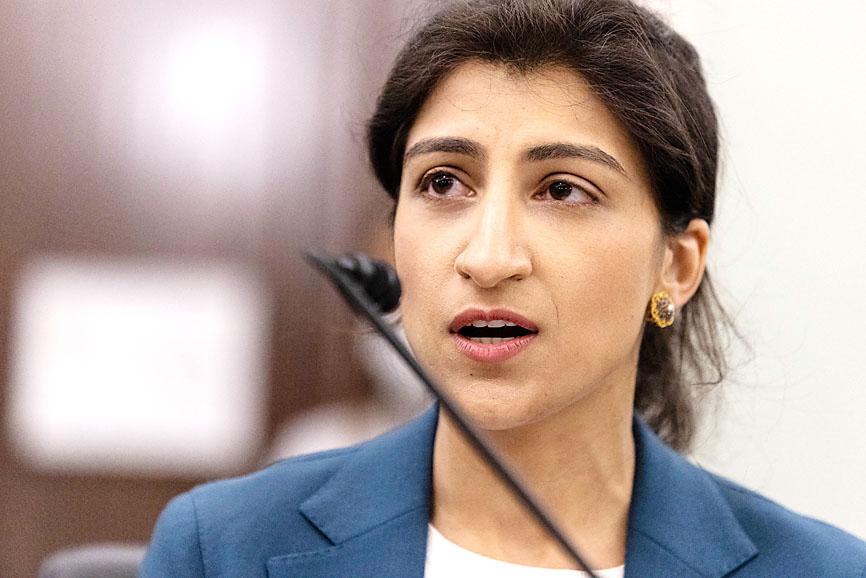Amazon.com Inc is asking that the new head of the US Federal Trade Commission (FTC) step aside from antitrust investigations into the e-commerce giant, contending that her past public criticism of the company’s market power makes it impossible for her to be impartial.
Amazon on Wednesday petitioned the agency to remove FTC Chair Lina Khan from taking part in probes of the company’s market conduct.
Khan has been a fierce critic of tech giants Facebook Inc, Google and Apple Inc, as well as Amazon. She arrived on the antitrust scene in 2017, writing an influential study titled “Amazon’s Antitrust Paradox” when she was a law student at Yale University.

Photo: AFP
Agency officials declined to comment on Amazon’s motion.
The agency could be expected to respond formally at some point.
As counsel to a US House of Representatives antitrust panel in 2019 and last year, Khan played a key role in a sweeping bipartisan investigation of the market power of the four tech giants.
US President Joe Biden last month installed Khan as one of five commissioners and head of the FTC, signaling a tough stance toward big tech and its market dominance.
At 32, she is the youngest head in the history of the agency, which polices competition and consumer protection in industry generally, as well as digital privacy.
“Due process entitles all individuals and companies to fair consideration of the merits of any investigation or adjudication by impartial commissioners who have not — and, equally importantly, who do not appear to have — prejudged the issues against them,” Amazon said in the motion.
The FTC has been investigating the tech giants.
On Monday, a federal judge dismissed antitrust lawsuits brought against Facebook by the FTC and a coalition of US states, saying that they did not provide enough evidence to prove that Facebook is a monopoly in the social networking market.
However, the judge allowed the FTC to revise its complaint and try again.
US regulators say that Amazon, the world’s biggest online retailer, controls 50 to 70 percent of online market sales.
Founded by Jeff Bezos, the world’s richest person, Amazon runs an e-commerce empire and ventures in cloud computing, personal smart technology and beyond.
Some independent merchants who sell products on Amazon.com have complained about the company’s practices, such as contract provisions said to prevent sellers from offering their products at lower prices or on better terms on any other online platform, including their own Web sites.
New legislative proposals approved last week by the House Judiciary Committee raised the issue of a possible forced spinoff of Amazon’s private-label products that compete with vendors on the platform.
In its defense, Amazon said that sellers set their own prices for the products they offer on its platform.
“Amazon takes pride in the fact that we offer low prices across the broadest selection, and like any store we reserve the right not to highlight offers to customers that are not priced competitively,” the company said.

Real estate agent and property developer JSL Construction & Development Co (愛山林) led the average compensation rankings among companies listed on the Taiwan Stock Exchange (TWSE) last year, while contract chipmaker Taiwan Semiconductor Manufacturing Co (TSMC, 台積電) finished 14th. JSL Construction paid its employees total average compensation of NT$4.78 million (US$159,701), down 13.5 percent from a year earlier, but still ahead of the most profitable listed tech giants, including TSMC, TWSE data showed. Last year, the average compensation (which includes salary, overtime, bonuses and allowances) paid by TSMC rose 21.6 percent to reach about NT$3.33 million, lifting its ranking by 10 notches

Popular vape brands such as Geek Bar might get more expensive in the US — if you can find them at all. Shipments of vapes from China to the US ground to a near halt last month from a year ago, official data showed, hit by US President Donald Trump’s tariffs and a crackdown on unauthorized e-cigarettes in the world’s biggest market for smoking alternatives. That includes Geek Bar, a brand of flavored vapes that is not authorized to sell in the US, but which had been widely available due to porous import controls. One retailer, who asked not to be named, because

SEASONAL WEAKNESS: The combined revenue of the top 10 foundries fell 5.4%, but rush orders and China’s subsidies partially offset slowing demand Taiwan Semiconductor Manufacturing Co (TSMC, 台積電) further solidified its dominance in the global wafer foundry business in the first quarter of this year, remaining far ahead of its closest rival, Samsung Electronics Co, TrendForce Corp (集邦科技) said yesterday. TSMC posted US$25.52 billion in sales in the January-to-March period, down 5 percent from the previous quarter, but its market share rose from 67.1 percent the previous quarter to 67.6 percent, TrendForce said in a report. While smartphone-related wafer shipments declined in the first quarter due to seasonal factors, solid demand for artificial intelligence (AI) and high-performance computing (HPC) devices and urgent TV-related orders

Prices of gasoline and diesel products at domestic fuel stations are this week to rise NT$0.2 and NT$0.3 per liter respectively, after international crude oil prices increased last week, CPC Corp, Taiwan (台灣中油) and Formosa Petrochemical Corp (台塑石化) said yesterday. International crude oil prices last week snapped a two-week losing streak as the geopolitical situation between Russia and Ukraine turned increasingly tense, CPC said in a statement. News that some oil production facilities in Alberta, Canada, were shut down due to wildfires and that US-Iran nuclear talks made no progress also helped push oil prices to a significant weekly gain, Formosa said